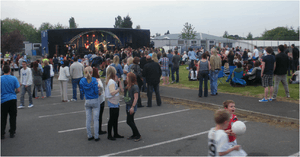George Spencer Academy
 | |
| Established | 1960 |
|---|---|
| Type | Academy |
| Headteacher | Fraser Mitchell |
| Location |
Arthur Mee Road Stapleford Nottinghamshire NG9 7EW England 52°55′15″N 1°16′01″W / 52.92082°N 1.26681°WCoordinates: 52°55′15″N 1°16′01″W / 52.92082°N 1.26681°W |
| DfE number | 891/5401 |
| DfE URN | 136291 Tables |
| Ofsted | Reports Pre-academy reports |
| Staff | ~150 |
| Students | 1353 |
| Gender | Mixed |
| Ages | 11–18 |
| Website | George Spencer Academy |
The George Spencer Academy (informally George Spencer; formerly George Spencer Foundation School and Technology College) is an English academy in Stapleford, Nottinghamshire, which encompasses both a secondary school and a sixth form on the same campus.[1] First opened in 1960, it was named after George Spencer, the headmaster of the Church Street Boys School from 1889 to 1927.[2] The school specialises in design and technology, with its sixth form being a Technology College (established in 2004). At the college, between three and five A-Levels can be studied.
Overview
The school is situated in Stapleford near the Toton boundary. Able to be seen from Stapleford's Bardill's roundabout, it has a lower and an upper site over the A52 and is consequently the only school in England to have a footbridge over an A road.
Students begin education at George Spencer at the age of eleven. The school has three feeder schools: Fairfield Primary School, Chetwynd Road Primary School and Bispham Drive Junior School, however children from other primary schools are able to apply. At the end of Year 11 (aged 16) around half the students choose to stay on at the academy's sixth form for further education. Year groups 7 to 8 are dubbed the "r-phase" and study "Learning to Learn" lessons until the end of Year 8, focussing on reflectiveness, resourcefulness and resilience. Years 9 to 11 are the "i-phase". Each year group is split into the P-half and S-half due to the school's large pupil intake to allow for easier lesson co-ordination. Students' forms are split into George Spencer's four houses: Armstrong, Hubble, Loxley and Socrates. These houses are named after academic pioneers, except Loxley which is named after the accepted birthplace of Robin Hood. George Spencer's school aim is "to achieve excellence through innovation and individualised learning".
History

1960-1980s
The school was established in 1960 and originally consisted of just the upper site (Stapleford side). It was expanded to include the lower site in the late 1970s.
1990s and 2000s
From the 1990s the school had around 900 boys and girls. A ballot of parents in 1993 resulted in the school becoming grant-maintained when known as George Spencer Comprehensive School. It has since become a foundation school and has been awarded Beacon School status. In 1994 it became one of the first schools to acquire the Technology College specialisation. It was thus known as George Spencer Foundation School and Technology College and was also a Leading Edge school.[1] Its sixth form Technology College opened in 2004.
On 18 October 2000 a pupil committed suicide by jumping off the bridge connecting the two sites [3]
2010 onwards

2010 was George Spencer's fiftieth birthday - the milestone was marked by turning the grey globe on the logo gold with a "50". "60s Day" took place on 19 November 2010 and an aerial photo of everyone associated with the school arranged in a "50" was due to take place on the main playing field on 24 March 2011 but was later cancelled. On 17 August 2010, following consideration of all the consultation feedback, the governing body of George Spencer Foundation School took the decision to continue the conversion to Academy status. After approval from the Secretary of State Michael Gove, the school successfully converted with effect from 1 September 2010, and was in the first wave of converted schools.
On 21 October 2010, George Spencer's hall was used as a venue for a question and answer session on government spending cuts, which saw Prime Minister David Cameron and deputy Prime Minister Nick Clegg visiting the school in the afternoon.[4] Also, ITV broadcast live from the hall for breakfast television programme Daybreak on 25 August 2011, showing several students opening their GCSE results.
To raise money for the 2011 Year 11 prom, students organised the academy's first music festival, The Big Friday Night, which was held on 6 May from 6:30pm. Singers and bands from the school performed on a portable stage on the school field. As a result of its success, the event returned on 30 March 2012.
Academic performance and achievement
The academy has been known for its reputatable GCSE and A-Level results. It received the second-best set of GCSE results from the Nottinghamshire LEA, tied with Rushcliffe School and behind Southwell Minster School. In 2010, Ofsted graded George Spencer "Outstanding", the school having passed all 27 of the criteria. This grade was maintained in 2015.
National Teaching Awards
Chris Haggett, the academy's director of activities, enterprise and enrichment, was presented with the teaching award for Enterprise in the East Midlands. He was then nominated in the same category at the Teaching Awards but did not attain the prize.[5]
Notable former pupils
- Ben King, actor and member of Rooster Teeth Productions[6]
- Nigel McCrery, screenwriter
- Saint Raymond, singer-songwriter
References
- 1 2 George Spencer Academy website
- ↑ D Edinborough, 1974, "Developments in Education: Stapleford 1870-1903"
- ↑ http://www.independent.co.uk/voices/commentators/what-drives-children-to-suicide-637666.html
- ↑ http://www.yorkpress.co.uk/leisure/national/8468101.Clips_from_Nick_Clegg_and_David_Cameron_at_George_Spencer_School_in_Nottingham___talking_about_budget_cuts_/
- ↑ guardian.co.uk
- ↑ roosterteeth.com
External links
- George Spencer - School-Centred Initial Teacher Training
- EduBase
- Selecting by ability not aptitude in August 2006